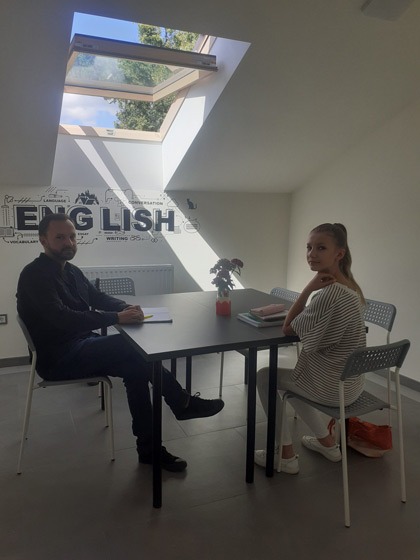Amidst the tough conditions caused by the ongoing conflict in the region, Bridge student and EFL teacher Sergii Bukhalov, from Ukraine, has been able to stand his ground and keep giving classes in his home country. He discusses his love for linguistics, how he’s been coping with the current situation, and how he’s been able to return to teaching English despite the challenging times.
Hi, Sergii! Can you tell us a bit about yourself?
I am 36. I live in Ukraine. I have a Bachelor’s in Teaching English for general schools. I’ve been teaching for about five years now, which includes private kindergarten, school and social center, and some private lessons.
My home city was under attack, so I left it after a week under fire. Now, I’m in another part of the country, which is safer. Here, I found a job in a teaching center and now have two groups of 12-year-olds.
I used to play the guitar a lot, but I only play it very seldom nowadays. I sometimes read about history, psychology, or philosophy. I’m also interested in linguistics – I like to find the origins of words and how words migrate from one language to another and what they mean in different languages. I also like wandering and rowing the canoe. Also, I write short novels from time to time.
What are the themes of your short novels?
From time to time, some sketches come into my mind and I feel like they’re worth being written. So, I may write a story during a walk or while sitting in a café. I mostly write in Russian, but I also write in Ukrainian, and I have tried to write in English. Now, I have one story in English; writing in English is an interesting experience and good language practice.
Most of my stories are about people and their relationships, their thoughts, their attitudes to life, and some paradoxical situations they get in. My stories often happen around conversation (e.g., a psychotherapist and his “strange” patient).
What inspired you to become an English teacher?
Actually, in Ukraine, it’s customary to get higher education, no matter if you really need it or not; it’s just because of prestige. Often, students don’t really know what to choose and they are given advice by their parents or friends. And also, many of them don’t really work according to their diploma. For example, a person may have a diploma in microbiology and work in construction. It’s a common practice. As my English wasn’t bad, I went to a pedagogic university. I can’t say my study was easy – I even thought about leaving. Nevertheless, I made it to the end and gained a bachelor’s diploma.
How has your interest in linguistics shaped you as an English teacher?
I got interested in linguistics a couple of years ago. I had a disease and I was in bed with a pencil and notepad for weeks. I wrote down some words that came to mind and found it interesting to find their origins to understand why they sound like they sound and what they mean. I was greatly surprised when I opened the Czech dictionary and realized that many words of so-called ancient Russian originally came from Eastern Europe.
Then, I started to find words in Russian and Ukrainian from Latin, English, or French that sound the same but have different meanings. For example, the word “problem” in Russian doesn’t refer to a task but is closer to “trouble,” so it has a negative meaning. So, I asked myself, “What was that? Was it poor translation, misunderstanding, or somebody’s intention to distort the meaning?” That understanding helps me to be more confident about the words I use.
In my lessons, I sometimes explain the meaning or pronunciation of the word by its origin, and that makes students interested and involved.

How has your teaching experience in your country been?
I wouldn`t say that teaching English in a Ukrainian state school brings you some special experience, which develops you as a strong professional. Though, except for some negative points like loads of paperwork, which seemed unnecessary and was not paid, and too much regulation, which was not really followed, there were also positive moments:
- The first one was a song festival, where I performed some songs played on the guitar with my students singing. They enjoyed that very much.
- Another great experience was the play “Robin Hood,” for which I was a director, scenario writer, and actor. My students got involved in the process rather seriously, seeking proper costumes and trying to act naturally.
- I also enjoyed working with some individual students, when the atmosphere is not so official and you can be more creative and try some activities you feel will be suitable.
How are you coping with the situation in Ukraine nowadays?
Well, not really good. The first week under shelling was terrible. You understand that something wrong is happening, but your mind just doesn’t believe it. And you realize that death is very close to you and may happen anytime. So, it affects your mental condition in a bad way. Now, I’m in a safer place, though I cannot say that I’m in a comfortable place. People here may sometimes be nervous, aggressive, or depressed, or they “don’t mind,” which is even stranger.
How has the war in your country affected your teaching work and your students?
When the war started, all of the educational institutions were closed. Children remained at home with their parents, most of whom became unemployed. Many schools in my city were destroyed. My private students moved to other countries. I tried to have online lessons but realized that it wouldn’t work. My mind was so anxious that I could not concentrate on teaching. So, after moving to another part of the country, I realized that I feel more confident and can keep on working here.
How did you find your current job at the teaching center?
After I rented a room, I started looking for a job. I was alone in a strange town, so I just went to the school and asked. Then, I went to the educational office to ask and, in the end, they gave me the number of the teaching center’s director. So, we met and I started to work there.
Can you tell us more about your teaching job?
I teach at a small private educational company. It has languages, preschool, and IT courses for children. There are about seven teachers and more than 50 learners. My students are preschoolers (five to six-year-olds) and secondary school students (12 to 13-year-olds), and elementary students.
As I had experience teaching preschoolers, I started working with them. There were three groups of about 10 children each. I had worked for a month. Then, the situation changed and I started to work with two groups of secondary school learners. That was better for me because of the students’ age and level. It’s also more interesting to work with them, as I can do different activities and use quizzes and word games.
Check out these ESL games and activities for kids and teens.
You’re currently completing the 120-Hour Master Certificate course. Why did you decide to take this course?
In the last few years, I felt like I got stuck in my life and had to change something, so I started thinking about what I could change. Then, I thought I should change some of my living conditions and I found ESL jobs in China. I passed the interview and almost went there, only I felt that I wasn’t really ready for that challenge. So, I canceled the trip but planned to get the TEFL certificate anyway, as it would allow me to work with foreign students. I found it interesting and challenging.
A few months ago, I found Bridge’s website while preparing for my lessons, and I realized that it was the proper time to start. So, I started it.
How has your experience with the course been?
Although there’s one lesson that seemed difficult to me, the others are easy considering my previous teaching practice. I’ve also learned new facts that explained to me some language difficulties that had been confusing me before. Also, I have noted some useful tips, like keeping a mistakes journal, that I hadn’t known before.
What are your plans for the next weeks or months?
When you hear on the radio about death and injuries every day, it’s really difficult just to keep on working. So, I plan to do some volunteer jobs. Firstly, in a medical van that has to be delivered to the soldiers in the East of Ukraine. A French volunteer and I are going to be drivers.
In general, the situation is rather unpredictable and is likely to worsen in autumn because of the cold. I cannot leave the country now, so the only way is if I deliver humanitarian aid from Europe. So, maybe that will be my business for the next months. In any case, I’m going to keep on studying. That keeps me busy and concentrated. Even with a phone, you can study during any free time as long as you have proper conditions.





